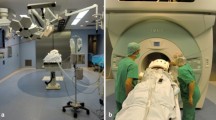Abstract
Integration of information from complementary imaging mo-dalities in medical image registration schemes potentially improves the registration accuracy. MRI is now being used for guidance of various neurosurgical procedures like anterior temporal lobe resection in patients with refractory temporal lobe epilepsy. Accurate localisation of critical white matter tracts, such as the optic radiation, during neurosurgery is critical in ensuring good patient outcome. Current commercial interventional MR scanners are capable of performing anatomical and diffusion weighted imaging. We propose a near real-time multivariate registration scheme that uses both anatomical and diffusion images from the pre and intraoperative imaging sessions. The registration framework is optimized for use on graphical processing units and we perform a full multivariate non-rigid registration in under three minutes making the proposed framework suitable for use under the stringent time constraints of neurosurgical procedures. We assess the accuracy of our algorithm using a numerical phantom and demonstrate accurate localisation of the optic radiation in clinical datasets. This work could be of significant utility in image guided interventions and facilitate effective surgical treatments.
Access this chapter
Tax calculation will be finalised at checkout
Purchases are for personal use only
Preview
Unable to display preview. Download preview PDF.
Similar content being viewed by others
References
Wiebe, S., et al.: A randomized, controlled trial of surgery for temporal-lobe epilepsy. NEJM 345, 311–318 (2001)
Ebeling, U., et al.: Neurosurgical topography of the optic radiation in the temporal lobe. Acta Neurochirurgica 92, 29–36 (1988)
Archip, N., et al.: Non-rigid alignment of pre-operative MRI, fMRI, and DT-MRI with intra-operative MRI for enhanced visualization and navigation in image-guided neurosurgery. Neuroimage 35(1), 609–624 (2007)
Park, H.J., et al.: Spatial normalization of diffusion tensor MRI using multiple channels. Neuroimage 20(4), 1995–2009 (2003)
Avants, B.B., Duda, J.T., Zhang, H., Gee, J.C.: Multivariate normalization with symmetric diffeomorphisms for multivariate studies. In: Ayache, N., Ourselin, S., Maeder, A. (eds.) MICCAI 2007, Part I. LNCS, vol. 4791, pp. 359–366. Springer, Heidelberg (2007)
Studholme, C.: Dense feature deformation morphometry: Incorporating DTI data into conventional MRI morphometry. MedIA 12(6), 742–751 (2008)
Daga, P., et al.: Integrating structural and diffusion mr information for optic radiation localisation in focal epilepsy patients (2011)
Mattes, D., et al.: PET-CT image registration in the chest using free-form deformations. IEEE Trans. Med. Imag. 22, 120–128 (2003)
Rueckert, D., et al.: Nonrigid registration using free-form deformations: Application to breast MR images. IEEE TMI 18(8), 712–721 (1999)
Modat, M., et al.: Fast free-form deformation using graphics processing units. CMPB 98(3), 278–284 (2010)
Nvidia, NVIDIA CUDA Programming Guide (December 2008)
Kahan, W.: Pracniques: further remarks on reducing truncation errors. Commun. ACM 8 (1965)
Smith, S.M.: Fast robust automated brain extraction. Human Brain Mapping 17(3), 143–155 (2002)
Cook, P.A., et al.: Camino: Open-source diffusion-MRI reconstruction and processing. In: ISMRM (2006)
Author information
Authors and Affiliations
Editor information
Editors and Affiliations
Rights and permissions
Copyright information
© 2011 Springer-Verlag Berlin Heidelberg
About this paper
Cite this paper
Daga, P. et al. (2011). Improved Neuronavigation through Integration of Intraoperative Anatomical and Diffusion Images in an Interventional MRI Suite. In: Taylor, R.H., Yang, GZ. (eds) Information Processing in Computer-Assisted Interventions. IPCAI 2011. Lecture Notes in Computer Science, vol 6689. Springer, Berlin, Heidelberg. https://doi.org/10.1007/978-3-642-21504-9_16
Download citation
DOI: https://doi.org/10.1007/978-3-642-21504-9_16
Publisher Name: Springer, Berlin, Heidelberg
Print ISBN: 978-3-642-21503-2
Online ISBN: 978-3-642-21504-9
eBook Packages: Computer ScienceComputer Science (R0)




